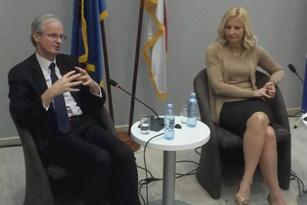
Director General of the DG NEAR of the European Commission Christian Danielsson said that Serbia was carrying out impressive economic reform, describing the Intergovernmental Conference on Monday, during which Serbia will open chapters 20 and 26, as a step forward.
At the debate titled “Serbia on the EU path“ held at the EU Info Centre in which Danielsson took part together with Tanja Miscevic, Head of Serbian EU negotiation team, Director General said that the pace and dynamics of EU accession talks was decided by Serbia and reminded that the accession process was not a sprint, but a marathon.
“In Europe, we say there is no time limitation. Serbia should carry out the process at its own pace. Reform takes time and the dynamics of the process will be decided by Serbia’s achievements,“ Danielsson said.
Danielsson: Serbia is well integrated into the EU, Member States account for 65% of Serbia’s overall trade
He described the meeting of the Intergovernmental Conference which will see the opening of two chapters as important and said he was hoping that such steps would continue in the future.
He also pointed to genuine political commitment to European integration shown by Serbia, adding that he is confident about the process and aware of its numerous positive elements.
“Serbia has made progress. A couple of years ago, we were talking about bankruptcy and what to do with state-owned enterprises, whereas today we are witnessing Serbia moving forward. We want to see Serbia accelerate on this path and become a wealthier and more successful society,” Danielsson said.
He said the EU expected its members to accept the jointly agreed foreign policy. Speaking about the relations among the countries in the region, Danielsson cited the Berlin Process and cooperation on infrastructure projects as a positive example, adding that the EU has secured some EUR1 billion for such purposes.
Danielsson said that Serbia was well-integrated into the EU, adding that Member States account for 65 percent of Serbia’s overall foreign trade.
“Of the remaining 35 percent, 20 percent of trade is carried out with the countries in the region. Russia and China account for a mere 10 percent of Serbia’s foreign trade,” Danielsson said, adding that the bulk of foreign direct investment comes from EU Member States as well. Strong economy is important as it creates environment conducive to reform implementation.
According to him, the EU is the best offer ever made to countries in the region.
Miscevic: Citizens’ support for EU membership rose to 48 percent
Head of Serbian negotiating team for the accession to the EU Tanja Miscevic said that EU non-refundable aid to Serbia has reached EUR2.5 billion.
“All countries in the region have accepted EU’s offer. We are beginning to understand what the EU itself has nearly forgotten – the appeal of European integration,” Tanja Miscevic said.
She said that citizen’s support for EU membership has risen from 42 to 48 percent, noting that the topic of European integration is not “hot” enough to make the headlines.
When asked whether the forthcoming election in Serbia would slow down the accession process, Miscevic said that during the last year’s election silence Serbia adopted action plans for chapters 23 and 24.
“The election has certainly slowed the process down, but it has not disrupted it,” Miscevic said and added that presidential election would in no way affect the work of the Parliament and the adoption of laws.
She said that many chapters were under preparation, adding that action plans for chapters 19 and 22 were ready. Those chapters could be opened by the end of 2017, she said but added that it was up to Member States to make the decision.
“We are working to submit as many negotiating chapters to Brussels as possible,“ Miscevic said and added that she was not pleased with the overall pace of negotiations.
She commented on Danielsson’s remark, about Serbia being the one to decide the pace of negotiations, by saying that “each road has many different stops and they are the ones affecting the pace.“
“Be it benchmark meeting, EU Members States’ assessment, overall EU environment or progress made on chapters 23 and 35. However, it should not be excuse for us,“ Miscevic said.
As the most challenging task on the EU path Miscevic cited the application of EU standards, adding that sometimes the EU has to remind what is good for Serbia.
“Our task is to calculate the pace at which we can transpose those standards into our national legislation. The same applies to every area,“ the Head of Serbian negotiating team said.
Details
- Publication date
- 1 March 2017
- Author
- Directorate-General for Neighbourhood and Enlargement Negotiations
